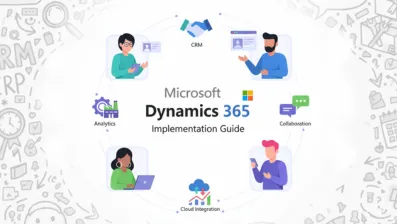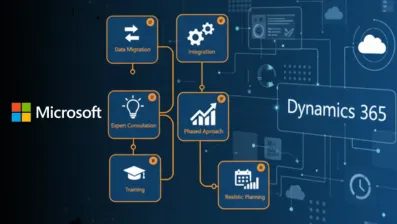Running a business today means managing countless moving parts from sales and finance to customer relationships and team collaboration.
That’s where Microsoft steps in with a game-changing tool: Microsoft Dynamics 365 modules.
These two ecosystems are designed to simplify how you work, connect your data, and empower your team to do more with less effort.
While Dynamics 365 focuses on streamlining your core business operations, Microsoft 365 enhances productivity and collaboration across your organization.
Together, they form a powerful digital foundation that helps you make smarter decisions, automate workflows, and deliver exceptional customer experiences, all in one connected environment.
In this blog, we’ll break down what these modules are, how they work, and why integrating them could be the smartest move for your business in 2025 and beyond.
What are Microsoft Dynamics 365 Modules?
If you’ve ever juggled between multiple tools to manage emails, documents, meetings, and teamwork, you’ll love how Microsoft 365 modules simplify it all.
At its core, Microsoft 365 isn’t just about Word, Excel, or Outlook. It’s a complete productivity suite designed to help you work smarter, collaborate better, and stay connected, anywhere, on any device.
Each module in Microsoft 365 is built to handle a specific need. You’ve got Teams for communication, SharePoint for collaboration, OneDrive for cloud storage, and Power BI for data insights.
Together, they create a seamless digital workplace that keeps your entire team in sync.
The beauty of Microsoft 365 modules lies in their integration. You can move from chat to a document to a meeting in seconds without switching apps or losing focus. It’s modern work, made effortless.
Types of Modules in Dynamics 365
Ever wished your business systems could finally get along? The list of Dynamics 365 ERP modules makes that possible with a seamlessly connected ecosystem.
Microsoft Dynamics 365 ERP modules are designed to simplify how you run your business from finance to supply chain.
Each module connects your teams, automates repetitive tasks, and helps you make data-driven decisions in real time.
Whether you're managing operations, handling finances, or tracking inventory, the list of Dynamics 365 ERP modules ensures everything works together seamlessly.
Type 1: Microsoft Dynamics 365 Business Central
If you’re a small or mid-sized business looking for an all-in-one solution, Dynamics 365 Business Central is your best friend.
It takes care of accounting, inventory, sales, and project management, all under one roof. You can easily track cash flow, automate invoicing, and get insights into what’s working (and what’s not).
No more juggling multiple tools, Business Central keeps everything running smoothly in one place.
Key Features:
Unified platform for finance, sales, and operations
Real-time cash flow and financial insights
Automated invoicing and expense tracking
Inventory and supply chain management
Project tracking and resource optimization
Type 2: D365 Finance
Managing finances can be a headache, but not with Dynamics 365 Finance.
This module gives you complete visibility into your company’s financial health.
From automating accounts payable to forecasting cash flow, it helps you stay one step ahead.
You can even track performance across departments and geographies, so you’re always in control of your bottom line. It’s finance made smarter, not harder.
Key Features:
End-to-end financial management
AI-powered cash flow forecasting
Automated accounts payable and receivable
Multi-entity, multi-currency support
Compliance and regulatory reporting
Type 3: Supply Chain
Keeping your supply chain running efficiently can be tricky, but the Dynamics 365 Supply Chain Management module makes it simple.
It lets you monitor production, track logistics, and predict demand with AI-driven insights.
Imagine being able to prevent stockouts before they happen or optimize your warehouse in real time.
That’s exactly what this module helps you do: turn supply chain chaos into streamlined performance.
Key Features:
Real-time production and inventory tracking
Predictive demand planning
AI-driven logistics and warehouse management
Supplier collaboration and quality control
End-to-end visibility across the supply chain
Type 4: Intelligent Order Management
In today’s fast-paced world, customers expect quick and accurate deliveries, and Dynamics 365 Intelligent Order Management helps you meet those expectations.
It uses AI and automation to manage orders from multiple channels, ensuring the right product reaches the right customer at the right time.
Whether you’re dealing with online orders or retail sales, this module helps you deliver every time, without the usual stress.
Key Features:
Omnichannel order processing
Real-time inventory visibility
AI-based order routing and fulfillment
Automated exception management
Integration with eCommerce and ERP systems
Type 5: Commerce
Running both online and offline retail operations? The Microsoft Dynamics 365 Commerce module bridges that gap beautifully.
It gives your customers a seamless shopping experience, whether they’re buying from your website, app, or in-store.
You can manage pricing, promotions, and inventory in real time. Plus, it gives you valuable insights into customer behavior, helping you craft more personalized and profitable shopping journeys.
Key Features:
Unified commerce across digital and physical stores
Centralized management of promotions and pricing
Real-time inventory synchronization
AI-driven product recommendations
Integration with CRM and payment gateways
Type 6: Dynamics 365 CRM Modules
When you want to understand your customers better, close more deals, and deliver seamless support, Dynamics 365 CRM modules have you covered.
These tools help you connect every customer interaction across marketing, sales, and service, so your team can work smarter, build loyalty, and grow faster.
Type 7: D365 Sales
With Dynamics 365 Sales, you get a clear picture of every lead and opportunity in your pipeline.
It helps your sales team prioritize deals, personalize conversations, and predict customer needs with AI-driven insights.
From tracking interactions to automating follow-ups, this module turns every touchpoint into a potential win for your business.
Key Features:
Intelligent lead scoring and prioritization
Automated sales workflows and reminders
Customer behavior insights with AI analytics
Sales forecasting and opportunity tracking
Integration with Outlook, Teams, and LinkedIn
Type 8: Customer Service
Your customers deserve fast, consistent, and reliable support, and Dynamics 365 Customer Service makes that happen.
It equips your team with smart tools like case routing, chatbots, and omnichannel communication.
No matter where a customer reaches out, your team can respond quickly and effectively, creating experiences that keep people coming back.
Key Features:
Omnichannel customer communication
AI-powered chatbots and case routing
Knowledge base and self-service portals
Real-time performance dashboards
SLA and case tracking automation
Type 9: Dynamics 365 AI
Artificial Intelligence is where Dynamics 365 gets truly exciting.
The Dynamics 365 AI suite adds intelligence to your data, helping you predict trends, personalize engagement, and make smarter business decisions.
Whether you’re in sales, finance, or marketing, these AI-powered insights help you move from reacting to anticipating what’s next.
Key Features:
Predictive analytics and data modeling
Customer behavior and sentiment analysis
Automated forecasting and trend identification
Integration across business functions
Decision support through AI-driven insights
Type 10: Customer Insights
Imagine knowing what your customers want before they even tell you.
Dynamics 365 Customer Insights makes it possible by combining data from multiple sources into one clear view.
You can segment audiences, predict behaviors, and deliver personalized experiences that drive loyalty. It’s like having a marketing crystal ball, only powered by AI.
Key Features:
Unified customer data platform
AI-driven segmentation and profiling
Real-time personalization and targeting
Predictive analytics for behavior forecasting
Seamless integration with marketing tools
Type 11: Sales Insights
Dynamics 365 Sales Insights helps your sales team work intelligently, not endlessly.
It analyzes your sales data to identify trends, suggest next best actions, and even flag at-risk deals before they slip away.
With predictive scoring and conversation intelligence, your team can focus on the right leads at the right time.
Key Features:
Predictive lead and opportunity scoring
Conversation and sentiment analysis
AI recommendations for next actions
Pipeline health and deal risk tracking
Integrated sales performance analytics
Type 12: Finance Insights
Managing finances becomes a lot easier with Dynamics 365 Finance Insights.
It uses AI to forecast cash flow, identify potential risks, and automate tedious financial processes.
You can make data-backed decisions confidently and plan your next move with precision. It’s finance management redefined with the power of intelligent automation.
Key Features:
Automated cash flow and budget forecasting
Risk and anomaly detection
Predictive expense management
AI-driven financial insights
Intelligent automation for accounting tasks
Type 13: Dynamics 365 Mixed Reality
Step into the future with Microsoft Dynamics 365 Modules that merge the digital and physical worlds. Welcome to Dynamics 365 Mixed Reality.
These tools empower your workforce to visualize, collaborate, and solve real-world problems using immersive technology.
From training new employees to inspecting complex equipment, mixed reality turns everyday tasks into interactive experiences that boost productivity and learning.
Key Features:
Mixed reality-based collaboration tools
Immersive training and visualization experiences
Real-time 3D modeling and annotations
Integration with HoloLens and Teams
Streamlined inspection and maintenance workflows
Type 14: D365 Guides
Dynamics 365 Guides helps your team learn by doing.
Using step-by-step holographic instructions, employees can complete complex tasks without constant supervision.
It’s perfect for onboarding, maintenance, or hands-on training, letting workers follow visual cues in real-time, reduce errors, and retain knowledge faster. Think of it as a virtual mentor that’s always there when needed.
Key Features:
Step-by-step holographic guidance
Real-time employee assistance and tracking
Integration with HoloLens devices
Error reduction through visual instructions
Analytics for performance improvement
Type 15: Remote Assist
With Dynamics 365 Remote Assist, distance no longer limits expertise.
Your field teams can collaborate with remote experts through real-time video, annotations, and 3D visuals.
Whether it’s fixing machinery or inspecting assets, problems get solved faster without costly travel. It’s like having your best technician on every site, instantly.
Key Features:
Real-time remote collaboration
Live video and 3D annotation tools
Integration with Microsoft Teams
Reduced travel time and costs
Instant access to expert guidance
Type 16: Product Visualize
Dynamics 365 Product Visualize brings products to life before they’re even built.
Using augmented reality, you can showcase 3D models of products to customers in their actual environment.
This helps clients visualize scale, design, and functionality, making buying decisions faster and more confident. It’s the ultimate sales companion for a modern, immersive customer experience.
Key Features:
Augmented reality-based 3D product visualization
Real-time customization and interaction
Integration with Dynamics 365 Sales
Accurate size and spatial representation
Enhanced customer engagement and trust
Type 17: D365 Modular Application
Innovation meets flexibility with Microsoft Dynamics 365 Modules, and the D365 Modular Applications are proof of that.
These applications let businesses adapt to changing needs with scalable, AI-driven tools that enhance security, retail operations, and customer experiences.
Each app can be used independently or integrated seamlessly for a connected business ecosystem.
Key Features:
Modular deployment and scalability
Seamless integration across Dynamics 365 apps
AI-powered business insights
Enhanced retail and operational capabilities
Centralized data management and reporting
Type 18: Fraud Protection
Dynamics 365 Fraud Protection safeguards your business from evolving digital threats.
It uses AI to detect suspicious patterns, prevent payment fraud, and reduce chargebacks, all while maintaining a smooth customer experience.
With real-time risk evaluation and adaptive learning, it helps you stay a step ahead of fraudsters and protect your revenue with confidence.
Key Features:
Real-time fraud detection and prevention
Adaptive machine learning algorithms
Identity and purchase protection
Chargeback insights and management
Integration with payment gateways
Type 19: Connected Store
Dynamics 365 Connected Store transforms brick-and-mortar retail into a data-driven powerhouse.
It gathers insights from cameras, sensors, and analytics to monitor customer behavior, optimize store layouts, and improve operations.
You’ll understand traffic patterns, enhance in-store experiences, and make smarter staffing decisions. It’s how traditional retail gets a digital-age upgrade.
Key Features:
AI-driven customer behavior analytics
Real-time foot traffic and sensor insights
Store layout optimization
Integration with Dynamics 365 Commerce
Operational efficiency and staff optimization
Implementation & Deployment Considerations
A smooth Microsoft Dynamics 365 implementation can be the difference between a successful digital transformation and a frustrating rollout.
The process isn’t just about installing software; it’s about aligning technology with your business strategy.
With the right approach, Microsoft Dynamics 365 Modules can be deployed efficiently, empowering your teams and maximizing ROI from day one.
Here are some key considerations to ensure a seamless implementation journey:
1] Define Clear Objectives
Start with a well-defined vision of what success looks like. Identify which Microsoft Dynamics 365 Modules you need–Finance, Sales, or Supply Chain- and align them with your business goals. Clear objectives guide every step of your implementation.
2] Choose the Right Deployment Model
Decide whether a cloud-based, on-premise, or hybrid deployment works best for your organization.
Each offers different levels of control, scalability, and cost efficiency, so pick what matches your infrastructure and security needs.
3] Prioritize Data Migration
Your data is your biggest asset. Plan for smooth data migration, ensuring accuracy, security, and consistency across all systems. Clean, structured data ensures your D365 Modules function at peak efficiency.
4] Customize for Your Business
No two businesses are alike, so why settle for a one-size-fits-all setup? Customize the modules to fit your workflows, user roles, and KPIs.
This boosts adoption and ensures every feature adds measurable value.
5] Focus on User Training
The best technology is useless without user confidence. Train your employees to navigate and leverage the platform effectively. Hands-on learning sessions can help teams adapt quickly and use Dynamics 365 to its full potential.
6] Integrate with Existing Systems
Ensure your Microsoft Dynamics 365 Modules integrate smoothly with existing tools like Power BI, Microsoft 365, or third-party applications.
A connected ecosystem eliminates data silos and enhances collaboration across teams.
7] Monitor and Optimize Continuously
Implementation isn’t a one-time event-it’s an ongoing process. Track performance, gather feedback, and fine-tune configurations regularly.
This continuous improvement keeps your Dynamics 365 environment aligned with business growth.
8] Partner with Experts
Collaborate with a certified Microsoft application development company that understands your industry. Their expertise can save time, prevent errors, and ensure you get the most from your investment.
They also bring valuable insights from past implementations, helping you avoid common pitfalls and adopt best practices that lead to faster, more efficient results.
How to Choose the Right Microsoft Dynamics 365 for Your Business?
Choosing the right Microsoft Dynamics 365 modules can make or break your digital transformation journey.
With so many specialized tools available, it’s essential to focus on what truly aligns with your business objectives.
Here’s how to choose the right Microsoft Dynamics 365 modules that fit your needs perfectly.
1. Identify Your Business Needs First
Before jumping into module selection, analyze your core business goals and identify common Microsoft Dynamics 365 challenges to ensure you select modules that effectively overcome them..
Are you struggling with sales tracking, financial reporting, or customer engagement? Once you pinpoint your biggest issues, you can choose the Dynamics 365 modules that specifically address them, ensuring a solution that drives measurable impact.
2. Evaluate Departmental Priorities
Each department operates differently, and its needs vary. Sales may require CRM capabilities, while finance might prioritize automation and accuracy.
Discuss with department leaders to identify key areas where Dynamics 365 can optimize workflows, streamline operations, and deliver quick wins across teams for maximum organizational alignment.
3. Consider Scalability and Future Growth
Don’t just think short-term — think scalable. Choose the right Microsoft Dynamics 365 modules that allow your business to expand effortlessly.
Start small with essential modules, then add more as you grow. This modular flexibility ensures your system evolves alongside your business goals without expensive re-implementations.
4. Analyze Integration Needs
Integration is key to a connected business environment. Ensure the modules you select work smoothly with tools like Power BI, Microsoft Teams, and third-party apps.
A well-integrated ecosystem eliminates data silos, promotes collaboration, and ensures every team operates from a single source of truth.
5. Look at Industry-Specific Solutions
Microsoft Dynamics 365 offers tailored modules for industries like retail, finance, healthcare, and manufacturing.
Choosing an industry-focused solution can save customization costs, simplify implementation, and provide features built around your specific operational needs, helping you achieve faster results and better business alignment.
6. Set a Realistic Budget
Each Dynamics 365 module comes with unique licensing and implementation costs. Assess your budget, weigh the ROI, and decide which modules deliver the most value now.
Cloud-based subscriptions are often more cost-effective, offering flexibility and scalability without large upfront investments or long-term commitments.
7. Involve Your Implementation Partner Early
Engage a certified Dynamics 365 partner early in your decision-making process.
They can assess your requirements, recommend the most effective module mix, and guide you through deployment.
Their experience helps you avoid costly mistakes, optimize your Microsoft Dynamics 365 implementation cost, and ensure the solution aligns perfectly with your business goals.
8. Plan for User Training and Adoption
Even the best ERP system fails without proper user adoption. Invest in comprehensive training and workshops to ensure employees understand and embrace the new system.
When users are confident, they leverage the modules effectively, maximizing productivity and achieving smoother business transitions.
9. Test Before You Commit
Before purchasing, explore trial versions or demos of Dynamics 365 modules. Testing helps you evaluate usability, performance, and compatibility with your data. This hands-on approach allows you to make an informed decision, ensuring your investment matches your business expectations and operational goals.
10. Measure Success with KPIs
After implementation, track performance metrics like efficiency gains, revenue growth, or customer satisfaction.
These KPIs help you understand if your chosen modules are delivering tangible value.
Continuous monitoring ensures your Dynamics 365 setup evolves and keeps delivering business excellence over time.
How DotStark Can Help You Choose the Right Microsoft Dynamics 365 Modules?
Choosing the perfect Dynamics 365 setup can feel like navigating a maze; every module looks valuable, but only a few truly fit your business goals. That’s where DotStark steps in to simplify the journey.
At DotStark, we go beyond basic implementation to understand what makes your business tick. Through our Microsoft Dynamics 365 consulting services, our certified specialists assess your processes, challenges, and growth objectives to help you choose the right Microsoft Dynamics 365 modules that align with your strategy and deliver measurable results.
We tailor each module, whether it’s Finance, Sales, Customer Service, or Supply Chain, to fit your workflow perfectly. From system integration and data migration to employee training and post-deployment optimization, we handle every stage to ensure a seamless transition.
With DotStark as your Dynamics 365 partner, you don’t just deploy technology; you empower your business with smarter automation, better insights, and a foundation built for future growth.
Conclusion
In today’s fast-changing business landscape, Microsoft Dynamics 365 Modules offer more than just digital tools; they provide an interconnected ecosystem that powers smarter decisions, seamless collaboration, and data-driven growth.
Whether you’re optimizing financials, improving customer engagement, or streamlining supply chains, the right module combination can revolutionize how your organization operates.
However, success depends on strategy, not just software. That’s where expert guidance matters. With a trusted partner like DotStark, you can confidently navigate the Dynamics 365 ecosystem, select modules that align with your goals, and achieve measurable business outcomes. The future of intelligent business management is here, and it starts with choosing the right Dynamics 365 Modules for your enterprise.
Frequently Asked Questions
Microsoft Dynamics 365 Modules are integrated business applications designed to manage core functions like sales, finance, supply chain, customer service, and marketing. Each module focuses on a specific business area while seamlessly connecting with others to create a unified digital environment.
Start by identifying your company’s challenges and goals. For instance, if you need better customer insights, go for CRM modules. If financial control and automation are priorities, choose D365 Finance or Business Central. Consulting an experienced Dynamics 365 partner like DotStark helps ensure the right fit.
Absolutely. One of the biggest advantages of Dynamics 365 is its modular structure. You can start with one or two essential modules and add more as your business grows. This flexibility allows you to scale without disrupting existing operations.
Deployment time depends on complexity and customization, but typically ranges from a few weeks to several months with expert guidance.
DotStark delivers tailored Microsoft Dynamics 365 Modules, ensuring seamless integration, faster deployment, and maximum ROI through expert strategy, customization, and ongoing support.

.webp)



.webp)

.webp)

.webp)

.webp)


 +91 9680599916
+91 9680599916
 vanshika@dotstark.com
vanshika@dotstark.com
